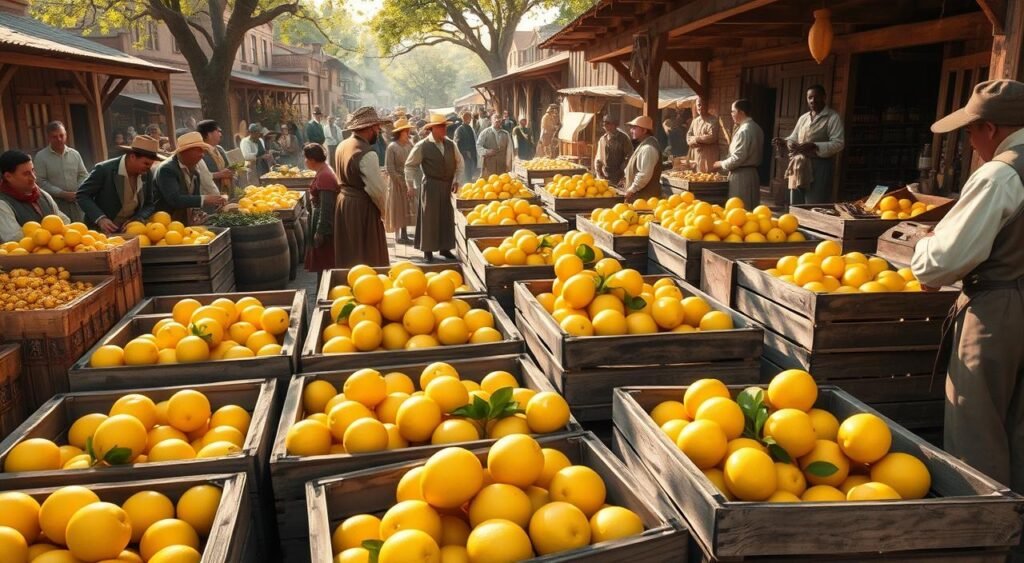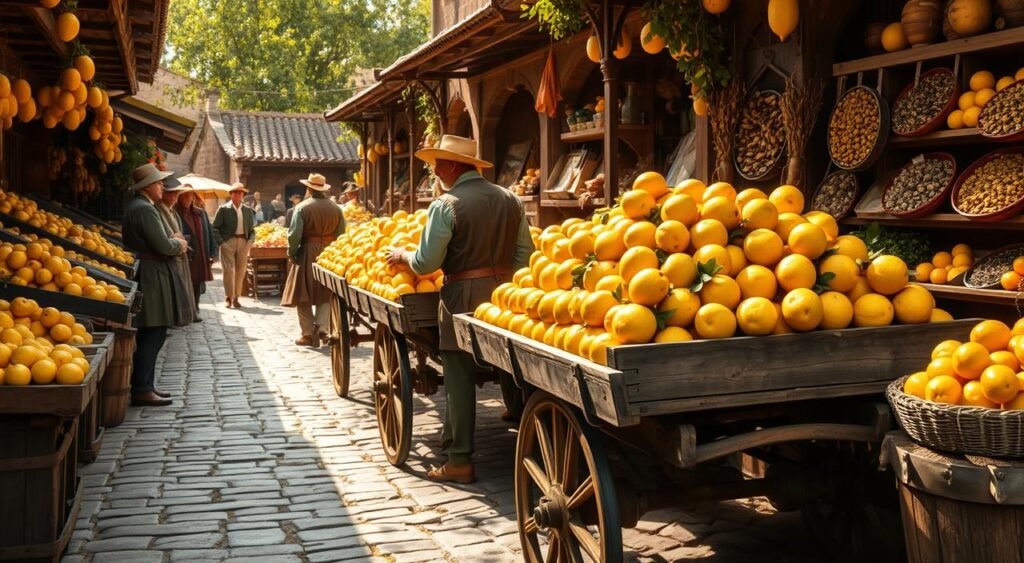Get ready for a journey back in time. We’re going to explore the life of an 18th century lemon merchant. They were key players in the historical citrus trade. You’ll see how they overcame obstacles and seized chances, helping the economy and society grow.
Picture yourself as an 18th century lemon merchant. You’re surrounded by the vibrant citrus market. The trade was complex, but lemon merchants were at its heart. Learning about them will give you a deeper look into their world and their influence.
Our journey will cover the citrus trade’s rise, the hurdles lemon sellers faced, and the opportunities they found. By diving into the life of an 18th century lemon merchant, you’ll understand the trade’s complexities and its lasting effects.
The Rise of Citrus Trade in the 1700s
In the 18th century, the citrus trade grew a lot. This was thanks to the booming fruit business. Merchants saw a big demand for lemons and other citrus fruits.
People wanted lemons more because they were popular and good for health. This led to new trade routes. These routes helped move citrus fruits across Europe.

The citrus trade grew because of new trade routes and more demand. Exploring this history shows how it helped merchants. It also shaped the economy back then.
The European Lemon Market Explosion
The demand for lemons in Europe skyrocketed. This was because the wealthy loved citrus fruits. They also knew they were healthy.
Maritime Trade Routes for Citrus
New trade routes were made to move citrus fruits. This opened up chances for entrepreneurs. They could make money from the growing citrus demand.
Economic Impact of Citrus Commerce
The citrus trade made many merchants rich. It brought new chances for business. The fruit business was key in this growth.
Read More: Enhance Your Decor with Captivating Metal Wall Art
Meet the 18th Century Lemon Merchant: A Day in the Life
Step into the world of an 18th century lemon merchant. You’ll find a life full of excitement and uncertainty. The lemon trade was booming, with merchants key in getting and selling lemons. They had to be good at the market, from talking to suppliers to dealing with spoilage and transport.
Your day starts early, at the docks to check the lemons. You’d look for quality and freshness, making sure only the best lemons are sold. You’ll learn about the challenges these entrepreneurs faced, from finding lemons to dealing with market complexities.

Merchants had to be quick and clever, making fast decisions to stay ahead. You’ll see how these entrepreneurs worked hard, from checking shipments to negotiating with suppliers. Their life was demanding but rewarding, giving us a peek into the past.
The Business of Selling Lemons in Colonial America
Being a 1700s fruit seller meant knowing how to price and profit. The lemon trade was a big network of people and places. Sellers had to think about supply and demand, shipping costs, and who else was selling lemons.
Keeping lemons fresh was key. Sellers used special ways to store and keep lemons good. This made their lemons popular and helped them keep customers coming back.
Pricing and Profit Margins
Setting prices was a big deal for sellers. They looked at how much it cost to move, store, and sell lemons. This helped them make more money and stay ahead of the competition.

Storage and Preservation Methods
How lemons were stored and kept was very important. Sellers used cool places and careful handling. This helped keep lemons fresh longer and reduced waste.
Distribution Networks
The way lemons were sold involved many people. Sellers worked with suppliers, distributors, and buyers. Building good relationships helped get lemons to market fast and well.
Also Read: Ancient Art: Exploring The Great Works of Early Civilizations
Tools and Techniques of Historical Fruit Trading
Exploring the lemon trade in the 18th century reveals the tools and techniques of lemon merchants. These entrepreneurs found ways to store, transport, and sell lemons. Their methods were key to the citrus trade’s success.
Wooden crates and barrels were often used by lemon merchants. They packed lemons carefully in these to avoid damage. The growth of the lemon trade also relied on special transportation vessels.
Picture being a lemon merchant in the 18th century. They faced the challenge of moving perishable goods over long distances. Their use of straw or sawdust to cushion lemons shows their creativity and resourcefulness.

The lemon merchant business was more than just buying and selling. It was a complex process needing careful planning and market knowledge. As you learn more about historical fruit trading, you’ll appreciate the early lemon trade pioneers.
Challenges Facing Lemon Merchants in the 1700s
Being a lemon seller in the 18th century was tough. The lemon trade was complex and competitive. Merchants faced many obstacles that could ruin their business. One big problem was moving lemons over long distances. This could lead to spoilage, theft, and damage.
Transportation Hurdles
Shipping lemons was a big challenge. Merchants had to deal with rough seas, extreme temperatures, and more. These factors could harm the quality of the lemons. Yet, the lemon trade kept growing. Merchants found new ways to beat these challenges.
Spoilage Prevention
To stop lemons from spoiling, merchants used wax coating and refrigeration. These methods helped keep the lemons fresh. This allowed them to sell lemons to more people. The lemon trade helped shape today’s citrus industry.
Market Competition
The lemon trade was very competitive. Many merchants wanted a piece of the citrus market. To succeed, they had to be very skilled and know the trade well. By facing these challenges head-on, they built successful businesses. These businesses helped the lemon trade grow.
Read More: Understanding the Hidden Symbolism in Famous Paintings
The Social Status of Fruit Merchants in Colonial Society
Fruit merchants were key in shaping colonial society. The lemon seller in 1700s was vital, providing lemons to many. Their wealth and influence grew, changing their social standing.
Merchant guilds were important for fruit merchants. They created a community and helped merchants share knowledge. This made fruit merchants respected in society.
The way fruit merchants did business showed their status. They brought lemons from the Mediterranean. The lemon seller in 1700s was a common sight, offering fresh lemons. Knowing about fruit merchants helps us understand colonial society better.
Class Structure and Trade
Colonial society was divided into classes. The wealthy were at the top, and the poor at the bottom. Fruit merchants were in the middle, with some getting very wealthy.
Merchant Guilds and Associations
Merchant guilds helped fruit merchants a lot. They allowed merchants to network and share knowledge. Joining these groups helped merchants improve their status and find new business chances.
Impact on Modern Citrus Industry Standards
Exploring the 18th century lemon trade reveals its lasting impact on today’s citrus industry. Innovations from that time, like refrigeration and packaging standards, have shaped the industry. These changes have made the citrus trade more efficient and widespread.
The 18th century lemon industry was key in forming today’s citrus standards. It set the stage for the industry’s growth. New technologies and practices have since transformed the trade, making it what it is today.
Learning about the historical citrus trade’s influence on modern standards is enlightening. It shows how the efforts of 18th century merchants have shaped the industry. Their legacy continues to guide the citrus industry, with many of their ideas still in use.
Notable Trading Partners and Business Relationships
In the 18th century, being a merchant meant building strong ties with suppliers and buyers. You would have worked with Mediterranean suppliers for top-notch lemons from Italy and Spain. These partnerships were based on trust and mutual gain, helping merchants get a steady flow of fresh produce.
Mediterranean Suppliers
The Mediterranean was key for lemons, and merchants would travel there to connect with farmers and suppliers. This allowed them to get better prices and a steady lemon supply. These suppliers were crucial for the fruit business, helping meet the demand for citrus in colonial America.
Colonial Buyers
Colonial buyers were looking for fresh lemons and other citrus fruits. Merchants would build relationships with these buyers, offering a variety of products and services. By knowing what customers wanted, merchants could improve their offerings, growing the fruit business.
Merchant Networks
The relationships between merchants, suppliers, and buyers were vital for the citrus trade’s success. Merchants used these networks to find new markets, get better deals, and stay competitive. As a merchant in the 18th century, navigating these networks was key to a successful fruit business.
Legacy of the 18th Century Lemon Trade
Exploring the 18th century lemon trade shows us the impact of lemon sellers. They helped shape the industry and the economy. Their work still influences the citrus industry today.
The lemon trade was complex, involving goods and services across regions. Lemon sellers faced challenges like transportation and marketing. Yet, their legacy lives on in today’s citrus industry.
Learning about the 18th century lemon trade offers insights into today’s citrus industry. It played a big role in the growth of cities and towns. Discovering the history of lemon sellers and the trade highlights its lasting impact.
Historical Lessons from a Successful Merchant
Exploring the lemon trade in the 18th century reveals valuable lessons. Successful merchants relied on adaptability and innovation. These traits are still important today. By learning from their strategies, you can understand what it takes to succeed.
Merchants used diversification and risk management to thrive. These tactics are still useful today. The 18th century lemon trade was tough, but smart merchants made it work.
Business Principles
Adaptability was key for lemon merchants in history. They adjusted their plans when the market changed. This skill is still crucial in many industries today.
Trade Strategies
Merchants also used diversification and risk management to stay competitive. They built strong relationships with suppliers and customers. Learning from these strategies can help you succeed in the citrus trade.
Conclusion
The legacy of the 18th century lemon merchant still shapes our citrus trade today. These pioneers set the stage for many modern practices. They taught us about storage, preservation, and how to get products to market.
Learning about the historical citrus trade helps us appreciate its global influence. Merchants overcame big challenges like tough transport and fierce competition. Their stories teach us about the value of hard work, creativity, and perseverance.
The tale of the 18th century lemon merchant shows us the power of innovation and trade. It highlights how commerce has shaped our world. Reflecting on this history can inspire your own business dreams or deepen your citrus industry knowledge.
FAQs
What was the role of 18th century lemon merchants in shaping the citrus trade?
In the 18th century, lemon merchants were key players in the citrus trade. They helped grow the European lemon market. They also set up trade routes and had a big economic impact.
How did the daily life of an 18th century lemon merchant look like?
Life for an 18th century lemon merchant was exciting but also full of challenges. They had to find good lemons, deal with market ups and downs, and keep their goods fresh.
What were the business aspects of selling lemons in colonial America?
Selling lemons in colonial America was a business. It involved setting prices, keeping lemons fresh, and building a distribution network. Merchants had to manage these well to succeed.
What were the challenges faced by lemon merchants in the 1700s?
Lemon merchants in the 1700s faced many challenges. They had to deal with transportation issues, keep lemons from spoiling, and compete with others. They found creative ways to stay ahead.
How did the social status of fruit merchants in colonial society impact their business?
The social status of fruit merchants mattered in colonial society. It affected their business. Merchant guilds helped them stand together and promote their interests.
What is the impact of historical citrus trade on modern industry standards?
The citrus trade of the past has shaped today’s industry. The work of 18th century lemon merchants led to modern practices like refrigeration and packaging standards.
What were the notable trading partners and business relationships of 18th century lemon merchants?
18th century lemon merchants traded with suppliers in the Mediterranean and colonial buyers. They built strong networks to move their goods successfully.
What is the legacy of the 18th century lemon trade?
The 18th century lemon trade’s legacy lives on in today’s citrus industry. The innovations and techniques from then are still used. Their impact on the economy and society is still felt today.
What historical lessons can be learned from the success of an 18th century lemon merchant?
Successful lemon merchants of the 18th century teach us valuable lessons. They show the importance of being adaptable and innovative. They also highlight the need for good trade strategies and navigating industry complexities.









